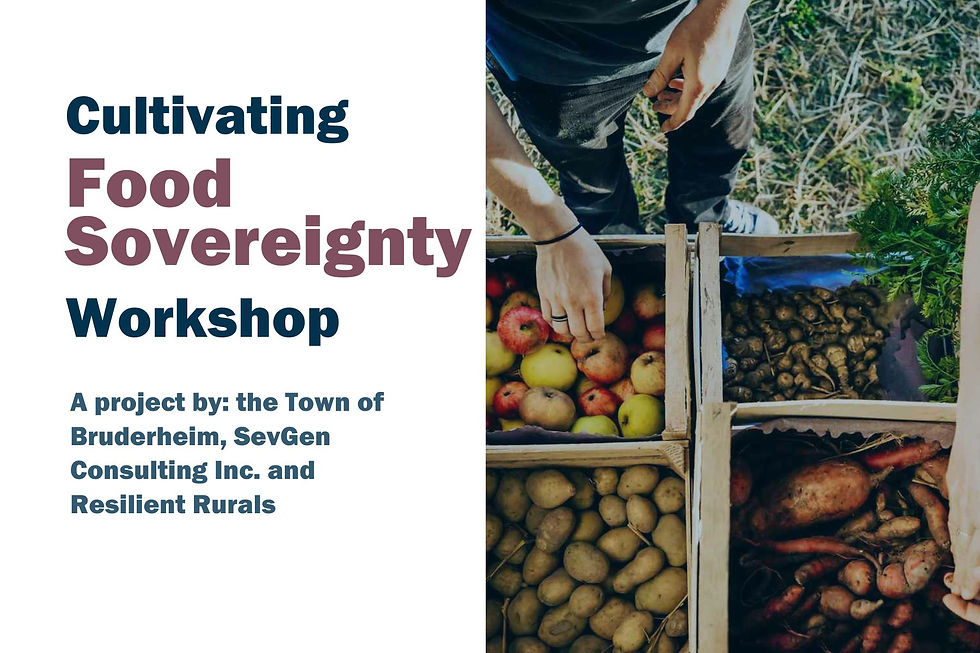Food For Thought
- Nov 15, 2023
- 4 min read
Resilient Rurals, SevGen Consulting Inc., and the Town of Bruderheim invite you to a day enjoying, sharing, and discussing our food. Where does our food come from? Who owns or manages the food we have access to? How do we keep our communities healthy? Cultivating Food Sovereignty is an opportunity to answer these questions and more.

Food is Valuable
Where would we be without food? Throughout time and space, food has been at the forefront of cultural change, family gatherings, and celebrations. Food is valuable. It is nourishing. Food creates nostalgia, builds connections, and fills stomachs.
Food is also complex. What we eat is connected to political, technical, sociological, environmental, economical, and global forces. The food on our dinner plates has been grown, processed, distributed, and marketed. It will be eaten and some will generate waste. Passionate people provide food services, as well as education and advocacy for safe and healthful food. We are all a part of the food wheel, and we all have a place in the food conversation.

Have you considered the processes behind the food you ate for lunch? Do you know where the vegetables or meat on your plate were grown? In a globally connected world, you might be eating food from anywhere. In an agriculturally inclined province, like Alberta, you may have even grown your food yourself.
We often take food for granted. When we are rushing to buy groceries, make dinner, or splurge on a night out, many don’t consider the complexities behind what we are eating. The list of what we don’t know about our food can include:
Who grew or made it? Were they compensated?
Where did it ship from? How many kinds of travel (air, sea, land) were needed?
How much has the price changed from when the ingredients were produced to the final product on my plate?
How much labour went into making these ingredients into food?
How will this food nurture my body? My mind?
The parts of the food system we don’t see are some of the most important and the most vulnerable. When we go to a stocked grocery store to buy our weekly groceries, we don’t usually consider factors like supply chains. The food is right there, so it should always be there. Right?
Food is Vulnerable
Following the COVID-19 pandemic, many of us realized we had taken food access for granted. A complex food system can be disrupted in many different ways. What if the next shipment can’t make it to the grocery store? What if ocean shipping routes are disrupted? What if a natural disaster disrupts the growing of an important crop?
Food is vulnerable to weather, transportation routes, and economic pressures.
Severe weather events, such as wildfires and flooding can have drastic impacts on the food system.
In Lytton, BC, both wildfires and flooding contributed to food spoilage, destruction, and disruption of food shipping routes. The residents of the town and neighbouring Kanaka Bar needed to find their own solutions to food security in their region. Due to their geographic limitations, a flood wiping out one road meant an abrupt halt of food transport into the community. Rural and remote locations are especially vulnerable to transportation interference.
During the wildfires in Alberta in spring 2023, there were other disruptions. The fires threatened livestock and cropland, and farmers were on the frontlines protecting their homes and communities. As families and towns evacuated, they were required to source their food from new places. If they did not have access to a kitchen, families had to buy expensive pre-made food on top of other necessities. Albertans and Food Banks alike banded together to support these displaced people, but the food system was shaken by this past wildfire season.
Less severe events also have enduring effects on food systems.
Wildfires were followed by a very hot and very dry summer. In southern Alberta, crops that would normally flourish grew poorly, resulting in insurance write-offs and poor production. Immediate effects were seen on grains such as wheat but impacts rippled beyond the price of bread. Albertan grains are used to make cattle feed, and without strong production, beef prices have soared in stores as cattle feed costs skyrocket.
Temperatures are predicted to rise. Wildfires and floods are predicted to occur more frequently. Consider the impacts of these events on the food we eat. What effects have we already witnessed and overcome? What steps can we take to protect our food systems? How can we nurture our local economies and farmers?
Food is Community
Luckily, the conversation around food systems and resilience-building is not new. Many producers, advocates, and distributors are working to understand the strengths and weaknesses of our food system. They are operating on the front lines, maintaining our access and quality of food, and advocating for better conditions for those without.
Producers, advocates, and distributors are all a part of a community - a community that cares about how our food is grown, where it comes from, who it supports, and how it nourishes us.
On November 28th, 2023, Resilient Rurals will be hosting this community in our workshop, Cultivating Food Sovereignty. We are surrounded by brilliant minds and passionate hearts and are bringing both together for a day of learning and inspiration.
Join us to learn about innovative and inclusive school lunch programming, operated by the Maskwacîs Education Schools Commission. Learn from Harrold Family Farm about their operations while reducing their carbon footprint. Feel inspired by hydroponics programs such as Yellowhead Tribal Gardens, which provides fresh produce to the community while fostering food sovereignty. Our presenter list is ever-growing, and we all have something to bring to the food conversation.
Our workshop is a chance to learn, collaborate, and inspire others to care about the complexities and vulnerabilities in our food system. To buy tickets for this event, please visit our page on Eventbrite.
.png)


Comments